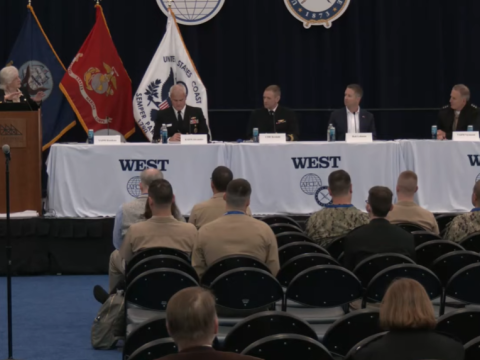President's Commentary: Intelligence Must Turn to a New Course
The intelligence community is in for major changes as it confronts new and emerging threats across the entire spectrum of operations.
The intelligence community is in for major changes as it confronts new and emerging threats across the entire spectrum of operations. While the challenges have developed over time, the intelligence community’s changes must be revolutionary, not evolutionary.
As different as the war on terrorism was from the Cold War, so is the current threat picture from traditional conflict profiles. Kinetic operations vie with cyber and social media activities for dominance in the new battlespace. Often, all three act in concert. Intelligence must focus not only on determining enemy activities before they have an effect, but also on waging operations that prevent or neutralize adversarial operations.
U.S. military forces in general are transitioning from a focus on the war on terrorism and counterinsurgency to potential conflicts with peer rivals. Intelligence faces the same challenge, but it must undergo far more consequential shifts to serve national security interests in the coming years. Countries such as Russia, China, Iran and North Korea are doing more than posing threats—they already have engaged the United States in cyberspace.
In addition to hostile operations in cyberspace, our adversaries are waging extensive disinformation campaigns that are severely affecting our own national dialogue. Past efforts by the Soviet Union focused on largely international perceptions; now these information inundations are targeted on U.S. domestic consumption, with measurable effects.
During the 15 years that characterized operations in Southwest Asia, many intelligence capabilities were allowed to atrophy. They are needed again, but it will not be so easy to fill those gaps.
Issues abound. In space, Russia and the United States have been joined by a plethora of nations with a variety of space-based capabilities, and not all of them are friendly. These capabilities can empower adversaries to target our strategic and tactical needs. Many of these vulnerable capabilities are intelligence-oriented, so the community has a dual mission of protecting its space assets while providing advance warning of space-based operations aimed at Earth. We might need more assets—larger pop-up constellations—in lower orbits.
Down on Earth, the mass migration across this country’s borders must not be ignored. For many reasons, having good intelligence on the people crossing the border is important. Enemy agents and organized criminals could be using the confusion at the frontier to infiltrate the country. This always has been a potential problem, but the threat level now is much greater.
A host of new technologies is open to adversaries. Easily available drones can collect huge amounts of information previously unobtainable by enemies. Databases can be—and often are—hacked for useful data. Open-source social media has turned our world into a virtual fishbowl.
And, of course, many of these capabilities can be tapped by our own intelligence community. They can provide excellent sources of information, but the wheat must be separated from the chaff.
New technologies such as artificial intelligence (AI) and machine learning are essential to future intelligence successes. They must be developed and mastered if the intelligence community is to properly exploit the mountains of data that are and will be feeding the intelligence machinery. We need to put a full-court press on machine learning to automate as much as possible to recognize and categorize valid and vital data.
Cyber is a new domain, and the ability to forecast and identify cyber attacks is a vital skill that must be developed. Similarly, intelligence must help sort through the massive disinformation campaigns plaguing our discourse and extract the truth for public consumption.
Intelligence systems must be sufficiently resilient to operate in a contested environment. Intelligence will be the linchpin for any future conflict operation, and its continued operation must be ensured in any crisis.
This is not to say that the future of intelligence will be techno-centric. We learned hard lessons when we de-emphasized human intelligence (HUMINT) years ago, and HUMINT must play a significant role in a complementary partnership with technology. Even as AI grows in importance, humans will hold the control card.
And people are at the core of effective intelligence. We must look again at how we’re training people for this new era in intelligence. Cognitive skills will be in great demand, and the community must determine its continuum of training. We need to establish the skills required for 2030, not just today.
As with all national security endeavors, these changes must come on the fly. There are no time-outs in intelligence. Yet the revolution must take place as soon as it can be implemented. In this dynamic era, the margin for error is virtually nil.


Comments